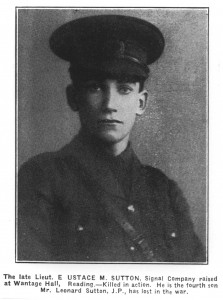Eustace Martin Sutton
Lieutenant 35th Signal Company
Royal Engineers
Division 65
 |
Eustace Martin Sutton was the second son of Leonard Goodhart Sutton and Mary Charlotte Sutton (nee Seaton). His mother died in July 1900 probably giving birth to the only girl in the family, Emily May. The family home was ‘Hillside’ Allcroft Road, Reading. He was the fourth of the Sutton brothers to lose his life in the war.
Eustace was educated at St. Andrew’s School Southborough, Kent and Repton School. He had qualified to enter Balliol College in 1915. However, he was appointed from his Officer Training Corps to a commission in the Royal Engineers and he entered the Army before going to Oxford. He went abroad in January 1916. The 35th Signal Company was one of three Royal Engineers raised in Reading at the behest of his father.
The German Spring Offensive along the Western Front began on the 21 March 1918. In the early days of the attack the Germans made fast progress and great advances with the British taken by surprise. The fighting was fierce but the British found themselves in retreat and the bodies of the fallen easily lost as the Germans advanced. Eustace Martin Sutton was killed in action on 24 March 1918 aged 22. He has no known grave and his name is commemorated on the Poziers Memorial, Somme.
The local newspapers reported that Mr Sutton had received the following letter from the Brigadier-General of the brigade to which Eustace Martin Sutton was attached.
“My dear Mr Sutton,
I am writing to express to you my great sorrow at the loss of your son, E.M.Sutton, and to offer you my very sincere sympathy.
He was killed most gallantly leading a counter-attack, made up of signallers and other headquarters men, who were hastily collected and thrown in to stop a local rush of the enemy round brigade headquarters.
I last saw him full of keenness dashing forward cheering on his own signallers and the other details he had collected.
The enemy who killed him was bayonetted by one of his own signallers.
He is a very great loss. We were all very fond of him in our mess. He was a most reliable worker, and most gallant on all occasions and in several previous fights had done most valuable work. His cheerfulness and unfailing good temper were invaluable.
Please accept my very sincere sympathy for your loss.”
A sapper in Eustace’s signal company wrote:
“Poor Mr Sutton died a real hero,leading his section. We are all proud of him, and I sincerely hope his gallant action, which undoubtably saved a critical situation, will be duty recognised. Mr Tomson has taken Mr Eustace’s place. One of my operators, named Mr Davis, was killed.
The company has suffered very severely again, especially in officers. Mr Sutton’s place will be very hard to fill, and we all miss him terribly. It seems as though we had all lost a brother and a good friend. Personally, I suppose, owing to my many happy associations with him, I feel his loss more than anyone else. He always treated me so well, and I feel almost broken-hearted.
He died a hero’s death, shot by a sniper though the head, as he was leading part of his section into action at a very critical time during an attack, and it is the opinion of my men that his gallantry undoubtedly saved the situation.”